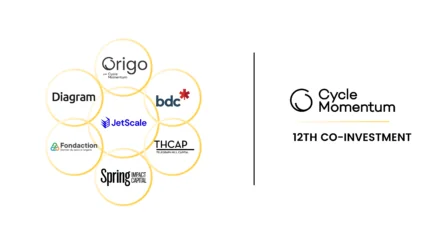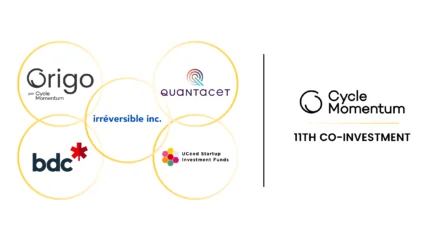By Maëlle Morin, Investor Community Lead at Cycle Momentum – Jennifer McDonald, Senior VP, Investments at Cycle Momentum & Thibault Beudin, Communication Officer at Cycle Momentum
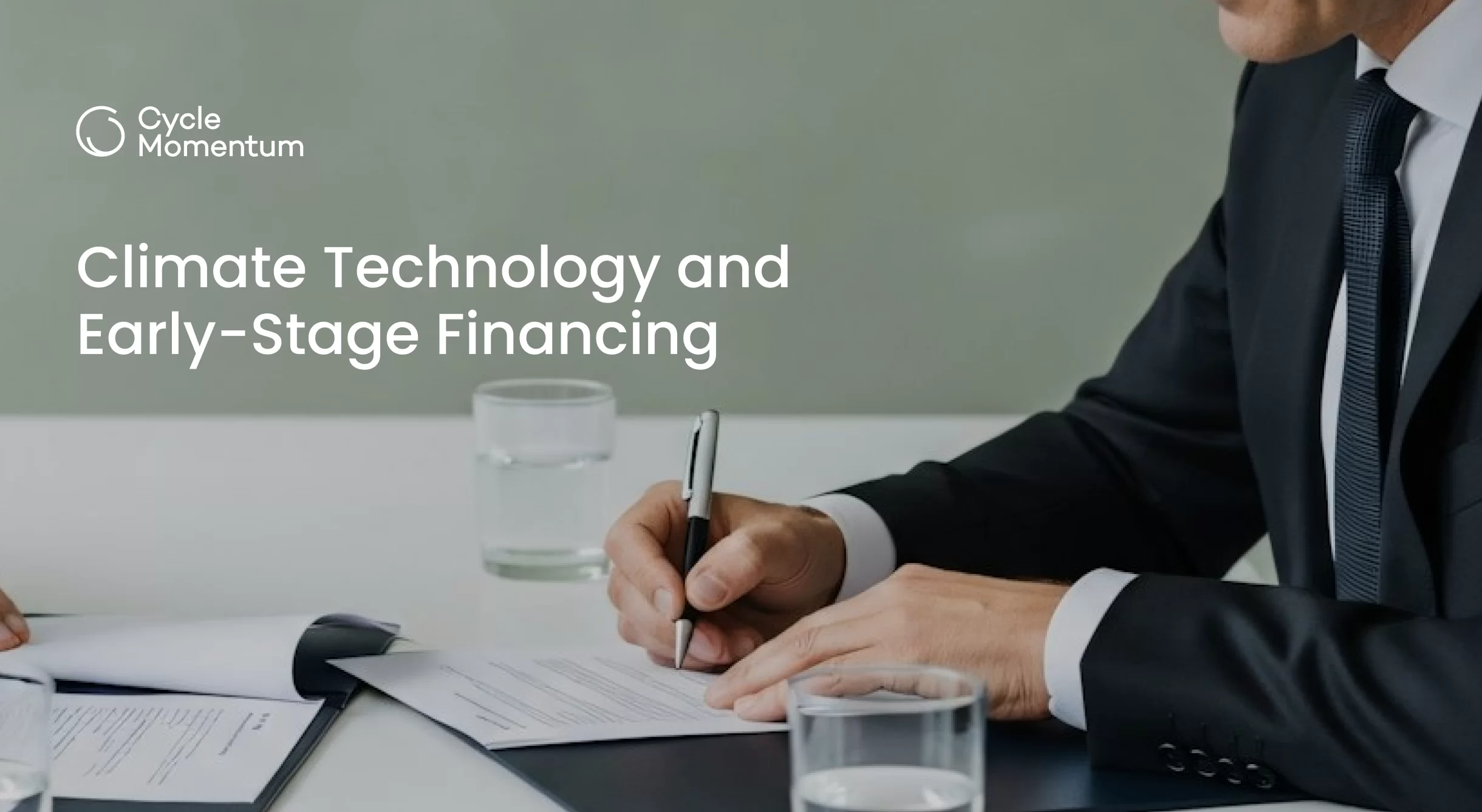
For over 10 years, Cycle Momentum has been running acceleration and open innovation programs to support the growth of climate tech entrepreneurs, helping them secure funding and bring their solutions to market. We foster essential collaborations between start-ups and industry players to accelerate commercialization.
Through our programs, we guide founders in refining their pitch, exploring funding opportunities, and developing a strong go-to-market strategy. Our programs support innovative hard tech companies involved in materials science, chemistry, biology, and other fields to address environmental challenges and promote planetary health.
In 2024, we launched Origo, an investment matching program designed to support pre-seed and seed-stage climate tech start-ups in Quebec. By engaging with founders from the earliest stages, we play an active role in their fundraising journey while providing strategic guidance through our accelerator programs.
The entrepreneurs interviewed in this article are part of Origo’s investment portfolio, including four alumni of Cycle Momentum’s acceleration programs. They share their firsthand experiences with early-stage fundraising – insights that will help you navigate today’s funding landscape, sharpen your strategy, and stay ahead of the game.
Introduction: What Makes Hard Tech So… Hard?
Hard tech startups,often called deep tech companies, are at the forefront of developing breakthrough technologies that can reshape entire industries. Unlike typical tech startups focused on software, these companies are tackling some of the world’s toughest challenges, from quantum computing and new robotics to critical materials and advanced manufacturing, defense, transportation. What sets hard tech apart is the sheer complexity and risk: hardtech investments involve long development cycles and require substantial capital before achieving commercial viability.
For early stage investors and angel investors, hard tech can seem daunting. The path to market is often longer and more uncertain than with software startups, and the capital required to build, test, and scale these technologies is much higher. This capital-intensive nature means that hard tech companies must work harder to convince venture capital firms and other investors of their potential for success. Connectivity is a crucial enabler for advancements in robotics, sensors, and industrial infrastructure, helping to address the electronics challenges that add complexity to product development and commercialization. Yet, for those willing to take the risk, the rewards can be transformative – not just for the companies themselves, but for the industries and communities they serve. As the world looks to solve complex problems in energy, supply chain, and planetary health, hard tech and deep tech startups are leading the charge, even if the journey is anything but easy.
Raising funds as an early-stage climate tech entrepreneur in Canada has never been easy, and this is true now, more than ever. With artificial intelligence dominating investor attention and political uncertainties looming (hello, “drill, baby, drill”), securing the right funding can feel like an uphill battle. Hard tech startups typically progress through a series of funding rounds, such as Series A, as part of the venture capital investment process.
The current generation of investors, shaped by the Silicon Valley and San Francisco tech booms, often have different expectations and risk appetites compared to those with decades of experience investing in hard tech, which can impact how startups are evaluated and funded.
To find out how to navigate this shifting landscape, we turned to the entrepreneurs at Origo, Cycle Momentum’s investment program, who’ve successfully navigated these waters. Patrick Racine (Chillskyn), Amanda Truscott (Rithmik Solutions), Jennifer Cote (Opalia), Wayne McIntyre (Relocalize), and Patrick Charest (Aplantex) shared their hard-earned insights – so you can take notes and avoid common pitfalls.
Hard Tech vs. Software: Different Investment Realities
Hard tech is a pillar of Climate tech. Compared to software, hard tech often requires long development and testing timelines that extend well beyond the hardtech investment horizons and exit strategies of traditional angel or venture investors. This creates unique funding challenges that entrepreneurs must navigate carefully.
Because startups are so capital-intensive, many require significant investment from angel investors in the first round before they can demonstrate revenue, making these early rounds crucial for bridging the funding gap and attracting future investors. Traditional VC stereotypes and investment patterns often make it more difficult for early-stage, capital-intensive hard tech startups to secure funding, as VCs may be hesitant to invest in technologies with longer timelines and higher perceived risks.
It’s important to note that hard tech does not always mean hardware – many startups are software-based. However, those that do involve hardware face unique engineering and electronics challenges that add complexity to product development and commercialization.
Lack of Early-Stage Funding: A Critical Gap
While Canadian cleantech investment overall has remained stable, seed-stage deals plummeted by 69% between Q2 2023 and Q2 2024. Specifically in Québec, Seed-stage venture deals dropped by more than half year-over-year, with dollars invested dropping by a sharp two-thirds. (BetaKit, 2025) Réseau Capital has tracked a weakening pre-seed and seed-stage landscape for entrepreneurs in Québec since Q1 2023 (Réseau Capital, 2025).
Adding to the challenge, less than half of Canadian hard-tech climate pre-seed and seed rounds in 2022 were led by Canadian firms. This lack of local investment leadership can make it harder for start-ups to attract international investors, as many prefer to follow a Canadian lead. (MaRS, 2025)
This funding gap poses a serious risk: without early support, fledgling hard-tech ventures struggle to reach commercialization. This is a burden on early stage start-ups that would have otherwise progressed beyond, impacting the pipeline health of future later stage companies. The consequences? Fewer made-in-Canada solutions, lost job creation, and missed economic opportunities as promising companies seek better support abroad.(MaRS, 2025) To provide clarity and credibility in financial planning, founders should list specific sources of non-dilutive capital for each project milestone.
The U.S. Political Landscape: A New Challenge for Canadian Entrepreneurs
Trump’s “Trade War” has put additional pressure on the Canadian economy, with trade between the two countries accounting for 77% of total Canadian goods exports and 63% of imports. Meanwhile, the U.S. market remains less reliant on Canada, with only 18% of its exports and 14% of its imports coming from its northern neighbor. (ScotiaBank, 2025)
With climate-focused policies seemingly on the chopping block, Canadian cleantech and hard-tech entrepreneurs face new obstacles: the U.S., once the most accessible and lucrative market for scaling, may no longer be a viable option. Investors there may be less eager to support cross-border ventures, and supply chain disruptions could further complicate operations for start-ups sourcing materials from the U.S.
Quebec: A Rising Climate Tech Hub
Quebec is emerging as a stronghold for climate solutions, with 26.4% of its total venture capital investment in 2023/2024 YTD directed toward climate tech – nearly double the global average of 13.6%. (Dealroom.co, 2024)
Quebec’s ecosystem includes leaders in categories such as biotech, industrial automation, and electronics, and these portfolio companies are recognized for their impact and innovation across the climate tech landscape. Quebec is also connected to the world’s leading climate tech programs, amplifying its influence and recognition on the global stage.
This distinctive investment culture might make Quebec a particularly strong ecosystem for cleantech entrepreneurs, where investors are more attuned to the realities and long-term potential of climate innovation.
Still, how can early-stage start-ups continue to thrive in this evolving environment?
We’re bringing you an inside look at the fundraising journey – directly from the entrepreneurs who’ve been in the trenches. Their insights will help you navigate this new reality, refine your strategy, and stay ahead of the curve.
Before Fundraising: What Worked, What Didn’t?
One thing became clear from our discussions: simplicity and clarity are your best allies. A strong, fact-based problem and solution statement will dismantle doubts and capture investor interest. Founders should also apply concrete rebuttals to common stereotypes and misconceptions about hard tech startups to improve their funding prospects. But what else?
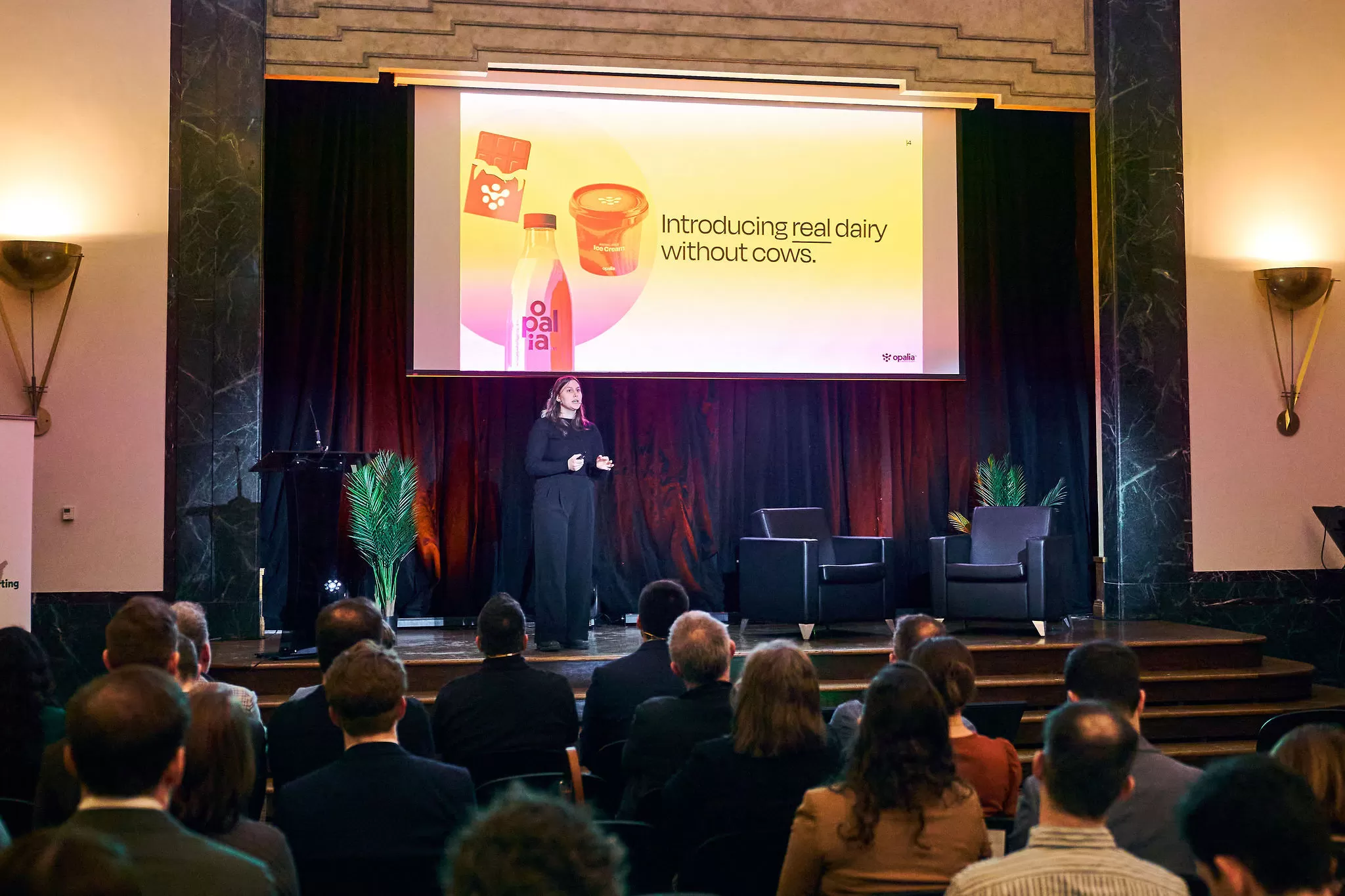
Jennifer Cote – Opalia, Pitching at Cycle Momentum’s recent Feu Vert event
Refining your pitch
Patrick R. shares: “Initially, we focused heavily on the uniqueness of our technology, assuming that would be the primary hook. However, we realized investors – especially in the current investment climate – care much more about commercial traction milestones. We had to refine our pitch to highlight the milestones and the activity that went along with it. You need to start early… but not too early.”
Amanda adds that being open to investor feedback early on strengthens your pitch. So why wait? Engage investors and refine your message before you go all in!
Timing and networking
Your outreach should align with key business milestones. Investors are looking for proof of traction. As Wayne puts it: “Use traction and execution. We always raise after achieving a significant milestone or new value-creating event.”
Jennifer took networking to the next level, attending conferences and meeting investors long before her company had a product to pitch. This strategy paid off, especially given her company’s long R&D cycle: “You have to create the timing by building relationships ahead of time, making good progress in the lab, and then lining up everything to make your fundraise happen.”
Pitching and Negotiating: Dos and Dont’s
DOs:
- Know your non-negotiables. Jennifer advises setting clear boundaries so you can compromise on less critical aspects.
- Highlight commercial viability. Patrick R. stresses: “Focus on how your business makes money – unit economics matter. Investors want a Green Discount, not a Green Premium.”
- Be efficient in discussions. Patrick R. and Patrick C. both recommend aligning early on investor involvement post-funding.
- Leverage third-party validation. Wayne suggests using endorsements or major milestones as negotiation leverage.
- Create competition. Having multiple investors at the table builds enthusiasm and strengthens your position.
DON’Ts:
- Be inflexible. Jennifer reminds us: “Investment is about partnerships. You have to be open to feedback and willing to adapt.”
- Rush to close. Fundraising is a marathon, not a sprint. Patrick R. advises: “Good investors bring more than capital – take time to find the right fit.”
- Ignore investor risk tolerance. Some risk-averse investors may get fired up or even withdraw support if you don’t show early revenue or traction, so be prepared to address these concerns.
- Assume investors understand your solution. Always connect the dots for them, helping them grasp the full potential of your innovation. It is not totally about selling, it is about bringing them to the same level of knowledge as you.
What Sets Climate Tech Investors Apart?
While all investors seek returns, climate tech investors stand out in a few key ways:
- Longer time horizons.
Climate solutions often require extended R&D phases. Jennifer notes that compared to generalist investors, climate investors are more comfortable with pre-revenue start-ups.
- Realistic expectations.
“AI has shifted perceptions about what is ‘high growth’ to almost unrealistic expectations,” says Wayne. Climate investors tend to have a more grounded view.
- Impact-driven focus.
“They care about CO₂ reduction, sustainability outcomes, and require a strong understanding of unit economics and customer benefits,” shares Patrick R.
- IP matters.
Amanda points out that climate investors place high value on intellectual property as a long-term asset.
The global impact of deep tech is significant, as the world’s need for sustainable solutions drives international engagement and the reach of leading portfolio companies across borders.
That said, not all experiences are the same. Patrick C. saw little difference, noting that core investor expectations and processes remain similar across sectors.
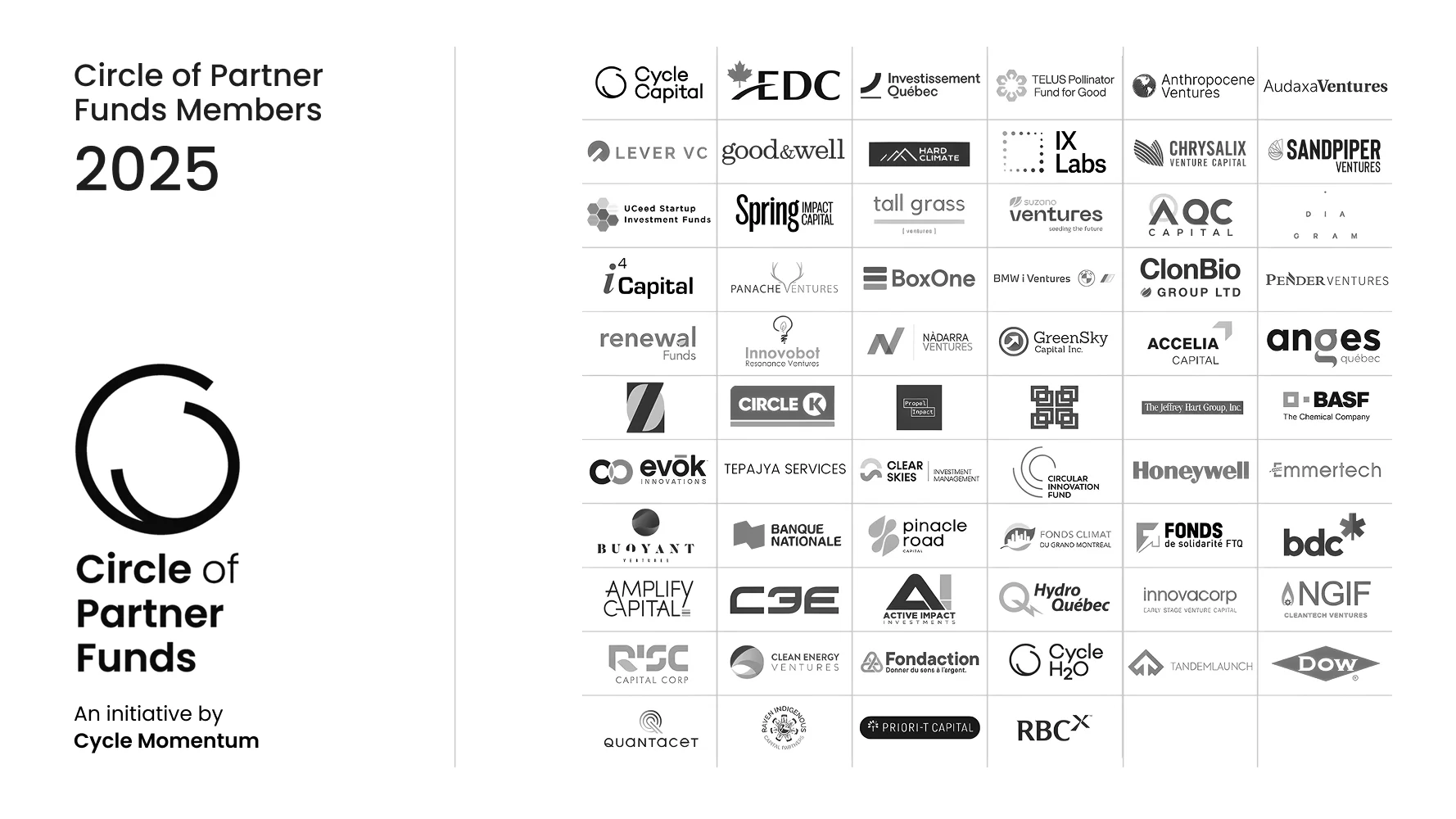
The members of Cycle Momentum Circle of Partner Funds – March 2025
Life After Fundraising: What Changes?
Strategy evolution
Post-investment, many founders found their strategies evolving with investor input – often for the better. Jennifer explains: “It makes the job less lonely and less stressful because you have people to go to for advice on things!” But she also cautions that conflicting advice can arise, reminding founders that they, ultimately, steer the ship.
Understanding exit strategies is also important – some hard tech companies are acquired, and considering potential acquisition scenarios, including valuation and exit multiples, is key for both founders and investors.
Time commitment
Managing investor relations is a major post-funding responsibility. Wayne warns that bringing more stakeholders to the table means more coordination, not less. Amanda adds that “investors can be pretty exacting in terms of information requirements.”
Relationships matter
At the heart of it all? Balance. Amanda shares that while investor scrutiny can feel intense, “it has been a much more supportive and collaborative relationship than I’ve heard such relationships sometimes are.” The right investors make all the difference.
The Fundraising Gauntlet: Navigating Capital
The way fundraising feels for hard tech founders is often like navigating a winding, uphill path – full of obstacles and uncertainty at every turn.
For hard tech startups, the road to securing funding is often a marathon, not a sprint. Unlike software companies that can quickly iterate and scale with minimal upfront investment, hardtech face steep capital requirements from the outset. Early stage investors may hesitate, wary of the long timelines and technical risks that come with developing new technologies. This makes it even more important for founders to be strategic in their approach to fundraising.
Building strong relationships with potential investors is key. Founders should focus on clearly articulating their value proposition, demonstrating a deep understanding of the market, and showcasing the potential for significant returns. Highlighting milestones – such as successful prototypes, pilot projects, or early customer traction – can help build investor confidence. Programs at Cycle Momentum and other leading startup accelerators offer invaluable support, providing not just funding but also mentorship, resources, and access to a global network of investors and partners. By leveraging these opportunities and staying persistent, startups can overcome the fundraising gauntlet and position themselves for long-term success.
Lessons from the Trenches: Challenges and Solutions from Canadian Founders
Canadian hard tech founders know firsthand that building a company in this space is not for the faint of heart. Accessing capital – especially at the earliest stages – remains a top challenge, as many investors are still more comfortable with the faster, less capital-intensive world of software. In reality, a lot of hard tech VCs have invested in these startups, which counters the misconception that raising capital is nearly impossible. However, Canada’s innovation ecosystem offers a growing array of resources to help bridge the gap.
Government funding programs, accelerators, and incubators are stepping up to provide critical support. Networking organizations and industry events help founders build relationships, share lessons learned, and open doors to new opportunities. By tapping into these resources and learning from the experiences of other Canadian founders, deep tech startups can navigate the unique challenges of their sector, secure the funding they need, and build the foundation for lasting success.
Beyond the Bottom Line: The Impact of Hard Tech on Planetary Health
Deep tech startups are uniquely positioned to drive meaningful change on a global scale. By developing technologies that address climate change, improve human health, and boost efficiency across industries, these companies are shaping a more sustainable future. For example, some startups have introduced the world’s first solutions in fields like carbon capture and advanced robotics, demonstrating true innovation and leadership.
The impact goes far beyond financial returns. By focusing on planetary health and sustainability, companies are helping to reduce emissions, conserve resources, and promote responsible growth. Innovations in areas like carbon capture, advanced robotics, and energy efficiency are not only good for business – they’re essential for the world’s future. As more investors and partners recognize the value of these technologies, startups will continue to play a vital role in building a healthier, more resilient planet for generations to come.
Final Advice: What Would You Do Differently?
- Jennifer Cote, Opalia: “Always more networking and meeting more people!”
- Wayne McIntyre, Relocalize: “Leverage your investors’ networks to accelerate your fundraising process.”
- Patrick Racine, Chillskyn: “Start engaging investors earlier – even before actively raising”. Also: “Push harder on non-dilutive funding alongside equity financing.”
- Amanda Truscott, Rithmik: “Rejection is part of the game…Dust yourself off, take feedback under consideration, and keep going. I once left my pitch deck behind at a crucial meeting – mistakes happen, but you learn and move forward.”
- Patrick Charest, Aplantex: “Be more direct when engaging investors.” Also: “Don’t rely too much on investors who haven’t given clear responses – hope is not a strategy.” (Hope is not a substitute for preparation).
What to retain?
- Stick to the fact, show progress and clearly define your path to growth when sharing your business idea
- Diversify your funding sources including non-dilutive options to extend your runway.
- Build and nurture every relationship – connections can open unexpected doors.
- Stay flexible and open to feedback when interacting with investors, but remember: you’re the one steering the ship.
Feeling inspired? Get in touch with Cycle Momentum, take these insights and put them into action. Engage with investors, refine your pitch, and most importantly – keep building meaningful relationships. The road to success in climate tech is long, but with the right strategy and the right investors, you can make it happen.
Resources
- Dealroom.co. (2024, July). “The Quebec Startup Ecosystem in numbers – 2024”. Dealroom.co, Quebec tech.
- Lorhinc, J. (2025, January). “Hard truth: Climate Ventures developing hard-tech solutions in Canada face a formidable funding gap.” MaRS Discovery District.
- MCLAUCHLAN. M (2025, March 12). “Quebec’s Dismisal Seed-Stage Performance Could Spell Trouble For Province’s Startup Pipeline.” Betakit.
- McNally, J. (2025, January 31st). “Canada-US Trade: Getting Up To Speed”. ScotiaBank.
- Réseau Capital. (2025, February)“Quebec Venture Capital and Private Equity Market Overview – Q4 2024”. Réseau Capital.
